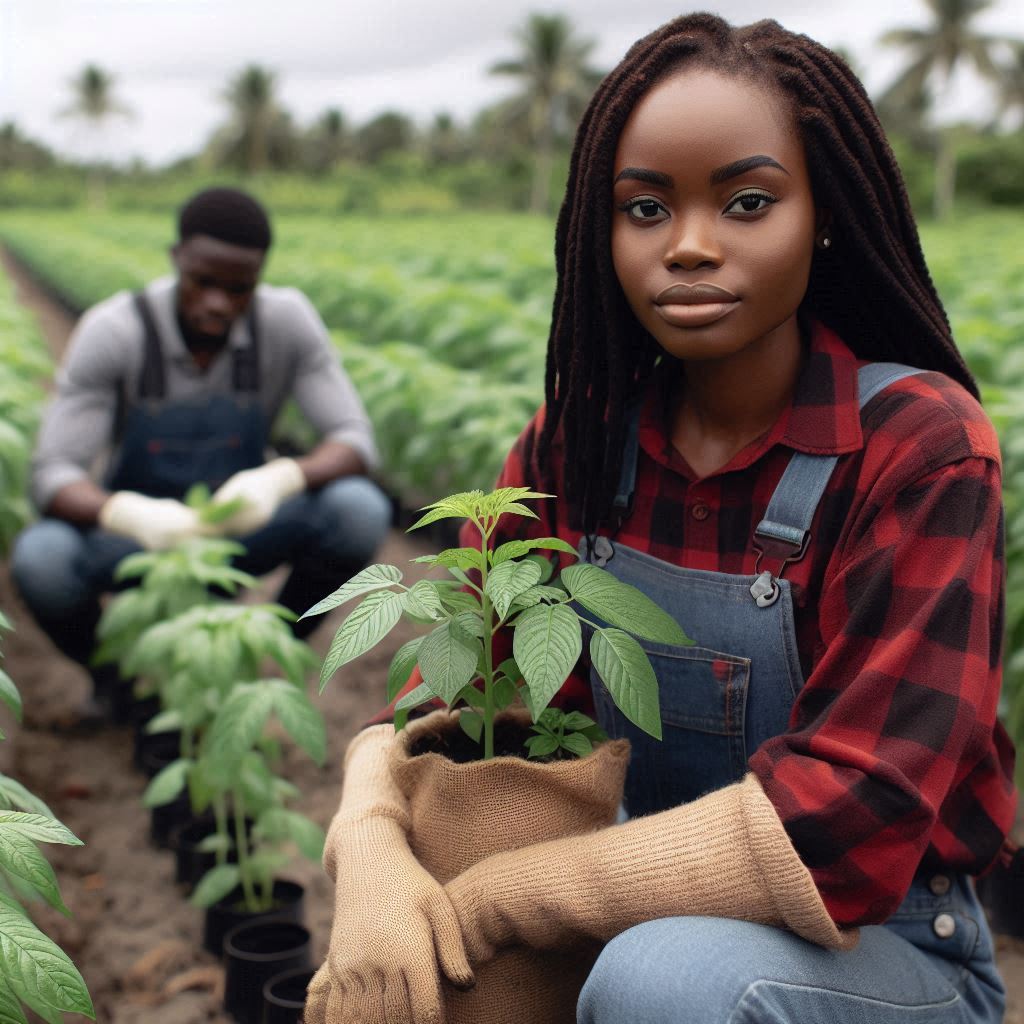Introduction
Plant breeding research is crucial for Nigeria’s agricultural development. It enhances crop yields, disease resistance, and food security. However, researchers face significant challenges in securing funding for their projects.
Limited financial resources hinder innovation and progress in this vital field. Without adequate funding, scientists struggle to develop and improve plant varieties suited to Nigeria’s diverse climates and soils.
These funding challenges limit the ability to address pressing agricultural issues, such as climate change and pest outbreaks.
Researchers often rely on external grants, which can be competitive and difficult to obtain. The lack of consistent funding sources hampers long-term research planning and project sustainability.
Despite these obstacles, the importance of plant breeding research remains undeniable. Securing sufficient funding is essential for advancing agricultural practices, ensuring food security, and promoting economic growth in Nigeria.
This section will explore funding opportunities and strategies to support plant breeding research in the country.
Importance of Plant Breeding Research
The role of plant breeding in improving crop yields and resilience to climate change
Plant breeding research plays a crucial role in improving crop yields and enhancing resilience to climate change in Nigeria.
By developing new plant varieties, researchers can address specific agricultural challenges and ensure more robust crop production. These efforts are vital for supporting the country’s growing population and economic stability.
Plant breeding improves crop yields by introducing high-yielding and disease-resistant varieties. These advancements help farmers produce more food on the same amount of land, increasing efficiency and profitability.
For example, breeding programs have developed rice and maize varieties with higher yields and better nutritional content, directly benefiting Nigerian farmers.
Resilience to climate change is another critical area where plant breeding research excels. Researchers develop crop varieties that can withstand extreme weather conditions, such as droughts, floods, and high temperatures.
These resilient crops ensure stable food production even in adverse environmental conditions, reducing the risk of crop failure and food shortages.
How research in this field can address food security challenges in Nigeria
Food security is a significant challenge in Nigeria, with a growing population and increasing demand for food. Plant breeding research addresses this issue by improving the availability and quality of food crops.
By developing varieties that mature faster and produce more, researchers help ensure a consistent food supply throughout the year.
Additionally, plant breeding research focuses on pest and disease resistance. Pests and diseases can devastate crops, leading to significant losses for farmers.
Breeding programs develop resistant varieties, reducing the need for chemical pesticides and enhancing sustainable agricultural practices. This not only protects the environment but also reduces production costs for farmers.
Plant breeding also contributes to the diversification of crops, promoting agricultural biodiversity. Diverse crops can better withstand pests, diseases, and changing climate conditions, ensuring a more resilient agricultural system.
This diversity is essential for long-term food security and sustainable farming practices in Nigeria.
Research in plant breeding addresses malnutrition by enhancing the nutritional content of staple crops.
Biofortified crops, such as vitamin A-enriched cassava and iron-rich beans, provide essential nutrients to communities, improving public health and reducing malnutrition-related issues.
Funding for plant breeding research is essential for achieving these goals. Without adequate financial support, researchers cannot develop and implement innovative solutions to agricultural challenges.
Investments in this field are investments in Nigeria’s future, promoting food security, economic growth, and environmental sustainability.
Securing funding from government agencies, international organizations, and private sector partners is crucial. Collaborative efforts can drive progress and ensure the successful development and dissemination of improved crop varieties.
Therefore, plant breeding research is vital for improving crop yields, enhancing resilience to climate change, and addressing food security challenges in Nigeria.
By prioritizing funding and support for this field, Nigeria can build a more sustainable and prosperous agricultural sector, ensuring food security and economic stability for future generations.
Read: Scholarship and Funding Opportunities for Forestry Students in Nigeria
Current Funding Landscape
- Overview of existing funding sources for plant breeding research in Nigeria.
- Analysis of the limitations and gaps in the current funding opportunities.
When it comes to funding opportunities for plant breeding research in Nigeria, it is crucial to understand the current landscape. Nigeria, being an agricultural hub in Africa, relies heavily on plant breeding research to enhance crop productivity and ensure food security.
However, funding for such research is not always readily available, and there are several limitations and gaps in the existing funding sources.
Overview of Existing Funding Sources:
In Nigeria, plant breeding research is primarily funded by a combination of government grants, international organizations, and private sector partnerships.
The government plays a significant role in funding research through agencies such as the National Agricultural Research Institutes (NARIs) and the Tertiary Education Trust Fund (TETFund).
International organizations like the International Institute of Tropical Agriculture (IITA) and the Bill & Melinda Gates Foundation also provide funding for plant breeding research in Nigeria.
These organizations often support collaborative projects with local research institutions to address specific agricultural challenges.
Private sector partnerships are another essential source of funding for plant breeding research in Nigeria.
Companies in the agricultural industry often invest in research projects that align with their business objectives, such as developing new crop varieties or improving agricultural practices.
Analysis of Limitations and Gaps
Despite the presence of multiple funding sources, there are several limitations and gaps in the current funding opportunities for plant breeding research in Nigeria.
One major limitation is the lack of sustained funding commitments from the government, which can lead to inconsistent support for research projects.
Additionally, international funding organizations may have specific research priorities that do not always align with the needs of Nigerian researchers. This can result in a mismatch between funding opportunities and the actual research requirements in the country.
Private sector partnerships, while valuable, may also have limitations in terms of long-term sustainability. Companies may prioritize short-term gains over long-term research investments, leading to challenges in maintaining continuous funding for plant breeding research.
Another gap in the current funding landscape is the limited availability of research grants for early-career researchers and graduate students.
Securing funding for preliminary studies and capacity-building initiatives can be particularly challenging for researchers who are just starting in the field of plant breeding.
Overall, while there are various funding sources for plant breeding research in Nigeria, it is essential to address the limitations and gaps in the current funding landscape.
By enhancing sustained government funding commitments, aligning international research priorities with local needs, and promoting long-term private sector partnerships, Nigeria can create a more robust and inclusive funding environment for plant breeding research.
Read: Overview of Horticulture in Nigeria
Government Initiatives
- Explore government-led initiatives to support plant breeding research in the country.
- Discuss the impact of government funding on research outcomes and innovations.
Government Support for Plant Breeding Research
In Nigeria, the government plays a crucial role in supporting plant breeding research through various initiatives and funding mechanisms. These initiatives are designed to promote scientific innovations, improve crop productivity, and enhance food security in the country.
By investing in plant breeding research, the government aims to address the challenges faced by farmers and contribute to sustainable agricultural development.
Government funding for plant breeding research in Nigeria comes from different sources, including the Federal Ministry of Agriculture and Rural Development, state governments, and research institutions.
These funds are allocated to research projects that focus on developing new crop varieties, improving crop yields, and increasing resistance to pests and diseases.
Government support is essential for advancing plant breeding research and driving technological advancements in agriculture.
Impact of Government Funding on Research Outcomes
The impact of government funding on research outcomes in plant breeding cannot be overstated. With adequate financial support, researchers can conduct extensive studies, acquire state-of-the-art equipment, and collaborate with experts in the field.
This leads to breakthrough discoveries, new crop varieties, and innovative solutions to agricultural challenges. Government funding enables researchers to explore new technologies, test cutting-edge techniques, and implement sustainable practices in plant breeding.
Government funding also has a direct impact on the capacity building of scientists and researchers involved in plant breeding research.
By providing financial support for training programs, workshops, and conferences, the government helps to nurture talent, develop skills, and expand knowledge in the field of agriculture.
This investment in human capital enhances the quality of research outputs, fosters collaboration among researchers, and promotes innovation in plant breeding.
Furthermore, government funding stimulates collaboration between research institutions, universities, and the private sector in plant breeding research.
By supporting partnerships and joint projects, the government encourages knowledge sharing, technology transfer, and the commercialization of research findings.
This collaborative approach accelerates the translation of research outcomes into practical applications, benefiting farmers, consumers, and the agricultural sector as a whole.
Innovations Supported by Government Funding
Government funding has led to several notable innovations in plant breeding research in Nigeria.
Through research initiatives supported by the government, scientists have developed high-yielding crop varieties, such as drought-resistant maize, disease-tolerant cassava, and pest-resistant rice.
These new varieties have significantly improved crop productivity, enhanced food security, and boosted farmers’ income.
Government funding has also facilitated the adoption of modern biotechnological tools in plant breeding research.
Techniques such as marker-assisted breeding, genetic engineering, and genomic sequencing have revolutionized the field of agriculture and accelerated the development of improved crop varieties.
These innovative technologies have the potential to address emerging challenges in agriculture, such as climate change, soil degradation, and pests.
In review, government initiatives and funding opportunities play a critical role in supporting plant breeding research in Nigeria.
By investing in research, the government contributes to scientific advancements, agricultural innovation, and sustainable development.
Continued government support is essential to nurture the talents of researchers, foster collaboration, and drive impactful outcomes in plant breeding research.
Read: Horticultural Tools and Equipment in Nigeria
Non-Governmental Organizations
Non-Governmental Organizations (NGOs) play a crucial role in providing funding and support for plant breeding research projects in Nigeria. These organizations have been instrumental in advancing agricultural research and development in the country.
Role of NGOs in Providing Funding and Support:
- NGOs provide financial resources for research projects, equipment, and infrastructure.
- They offer technical expertise and support to researchers involved in plant breeding research.
- NGOs facilitate collaboration and partnerships between researchers, farmers, and other stakeholders.
- These organizations advocate for policies that promote sustainable agriculture and support plant breeding initiatives.
- NGOs raise awareness about the importance of plant breeding research and its impact on food security.
Successful Collaborations in Nigeria
Several successful collaborations between researchers and NGOs in Nigeria have led to significant advancements in plant breeding research. The following are examples of such partnerships:
- Agricultural Development Program (ADP): ADP has partnered with research institutions and NGOs to promote the adoption of improved crop varieties among farmers.
Through training programs and field demonstrations, they have helped increase crop productivity and enhance food security. - International Institute of Tropical Agriculture (IITA): IITA collaborates with NGOs to develop high-yielding and disease-resistant crop varieties.
Their research efforts have resulted in the release of improved cassava, maize, and cowpea varieties that benefit smallholder farmers in Nigeria. - Farmers’ Associations: NGOs work closely with farmers’ associations to identify research priorities and implement plant breeding projects. By involving farmers in the research process, NGOs ensure that new crop varieties meet the needs and preferences of local communities.
- Environmental Conservation Organizations: NGOs focused on environmental conservation collaborate with researchers to develop climate-resilient crop varieties.
These partnerships aim to address the challenges posed by climate change and promote sustainable farming practices. - Women’s Empowerment Organizations: NGOs that focus on women’s empowerment support plant breeding research projects that benefit women farmers.
By providing training, resources, and market linkages, these organizations help improve the livelihoods of women engaged in agriculture.
Overall, NGOs play a vital role in funding and supporting plant breeding research in Nigeria.
Their collaborative efforts with researchers and other stakeholders have contributed to the development of high-yielding, disease-resistant crop varieties that enhance food security and improve the livelihoods of smallholder farmers in the country.
Read: Hydroponics in Nigerian Horticulture

International Funding Opportunities
- Discuss the importance of international partnerships for securing funding for plant breeding research.
- Highlight specific organizations and programs that offer grants for research projects in Nigeria.
Securing funding for plant breeding research in Nigeria can be a challenging task due to limited resources and funding opportunities within the country. As a result, researchers often seek international partnerships to access a broader range of funding options and resources.
International partnerships are vital for plant breeding research as they bring together experts from different countries, facilitating knowledge exchange, collaboration, and access to diverse funding sources.
By partnering with international organizations, researchers in Nigeria can enhance the quality and impact of their research projects while also expanding their network of collaborators.
Several organizations and programs offer grants specifically for research projects in Nigeria, focusing on areas such as crop improvement, sustainable agriculture, and food security.
These funding opportunities provide researchers with the financial support needed to conduct innovative research and address critical challenges in plant breeding.
Transform Your Career with Expert Guidance
Get personalized mentorship consulting that’s tailored to your unique path. Our expert advice is actionable and exclusive.
Get StartedSpecific Organizations Offering Grants
- The Bill & Melinda Gates Foundation: This foundation provides grants for agricultural research projects in Nigeria, with a focus on improving crop yields, enhancing agricultural productivity, and promoting sustainable farming practices. Researchers can apply for funding through the foundation’s Agricultural Development program.
- The International Institute of Tropical Agriculture (IITA): IITA offers research grants and fellowships to support plant breeding research in Nigeria. The organization focuses on developing and disseminating technologies that benefit smallholder farmers and enhance food security in the region.
- The African Union Development Agency (AUDA-NEPAD): AUDA-NEPAD provides funding opportunities for agricultural research and development projects in Nigeria. The agency supports initiatives that aim to strengthen food security, increase agricultural productivity, and promote sustainable farming practices across the continent.
- The World Bank: The World Bank offers grants and loans for agricultural projects in Nigeria, including those related to plant breeding research. Researchers can access funding through the bank’s Agriculture Global Practice, which focuses on transforming agricultural systems and improving rural livelihoods.
International partnerships play a crucial role in securing funding for plant breeding research in Nigeria, enabling researchers to access a wider range of resources and opportunities.
By collaborating with international organizations and programs, researchers can enhance the impact of their research projects and contribute to the sustainable development of agriculture in the country.
Recommendations for Researchers
Provide tips and strategies for researchers to successfully secure funding for their plant breeding projects
Researchers must develop clear and compelling proposals to secure funding for plant breeding projects. Start by clearly defining the project’s objectives, methods, and expected outcomes. Highlight the project’s significance and potential impact on Nigeria’s agricultural sector.
Craft a detailed budget that justifies each expense and aligns with the project’s goals.
Demonstrating careful financial planning can increase funding prospects. Ensure that your proposal includes a well-structured timeline, outlining key milestones and deliverables.
Leverage data and evidence to support your proposal. Show how previous research or pilot studies back your project’s feasibility and potential success. This builds credibility and convinces funders of the project’s value.
Engage with funding agencies early. Understand their priorities and tailor your proposal to align with their goals. This increases the likelihood of securing funding.
Regularly update your skills and knowledge. Attend workshops and training sessions on grant writing and project management. These skills are crucial for crafting effective proposals.
Suggest avenues for networking and seeking partnerships to strengthen funding opportunities
Networking is essential for strengthening funding opportunities. Attend industry conferences, seminars, and workshops to connect with potential collaborators and funders. These events provide platforms to showcase your research and establish valuable relationships.
Join professional organizations related to agriculture and plant breeding. Membership often provides access to exclusive funding opportunities, resources, and networking events.
Collaborate with other researchers and institutions. Forming partnerships can enhance your project’s credibility and attract more significant funding. Joint proposals often have a higher chance of success.
Seek partnerships with private sector companies involved in agriculture. These companies may offer funding, resources, and practical insights that can benefit your project.
Engage with international organizations and development agencies. Many of these entities fund agricultural research in developing countries. Establishing connections with them can open doors to substantial funding opportunities.
Utilize online platforms and databases to find funding opportunities. Websites like ResearchGate, Google Scholar, and professional association sites often list grants and fellowships available to researchers.
Consider interdisciplinary collaboration. Partnering with researchers from other fields can provide new perspectives and innovative solutions. This can make your proposal more attractive to funders seeking multifaceted approaches.
Maintain an active online presence. Use social media and professional networking sites to share your research and connect with potential collaborators and funders. A robust online profile can enhance your visibility and credibility.
Ultimately, researchers can successfully secure funding for plant breeding projects by crafting clear proposals, leveraging data, and engaging with funding agencies.
Networking and forming partnerships with other researchers, institutions, and private sector companies can strengthen funding opportunities.
Utilizing professional organizations, international agencies, and online platforms can further enhance your prospects. By following these strategies, researchers can ensure their projects receive the necessary support to advance Nigeria’s agricultural sector.
Conclusion
Plant breeding research in Nigeria relies heavily on funding opportunities. These resources are essential for driving innovation, enhancing crop yields, and ensuring food security.
The importance of funding cannot be overstated; it serves as the foundation upon which groundbreaking research is built.
Continued support and investment in plant breeding research are paramount. It’s not merely about financial assistance; it’s about investing in the future of agriculture.
With sustained funding, researchers can tackle pressing challenges, develop resilient crop varieties, and adapt to changing climates.
Moreover, funding opportunities empower researchers to explore new avenues, collaborate with industry partners, and leverage cutting-edge technologies. This synergy between funding and research fuels progress and propels Nigeria towards agricultural sustainability.
Emphasizing the need for ongoing support is critical. Plant breeding research holds immense potential to revolutionize agriculture and uplift communities. Therefore, policymakers, funding agencies, and stakeholders must prioritize investment in this critical field.
In essence, funding opportunities are not just about monetary support; they are about investing in Nigeria’s agricultural resilience, food security, and economic prosperity.
By nurturing plant breeding research, Nigeria can cultivate a brighter, more sustainable future for its people and the planet.




